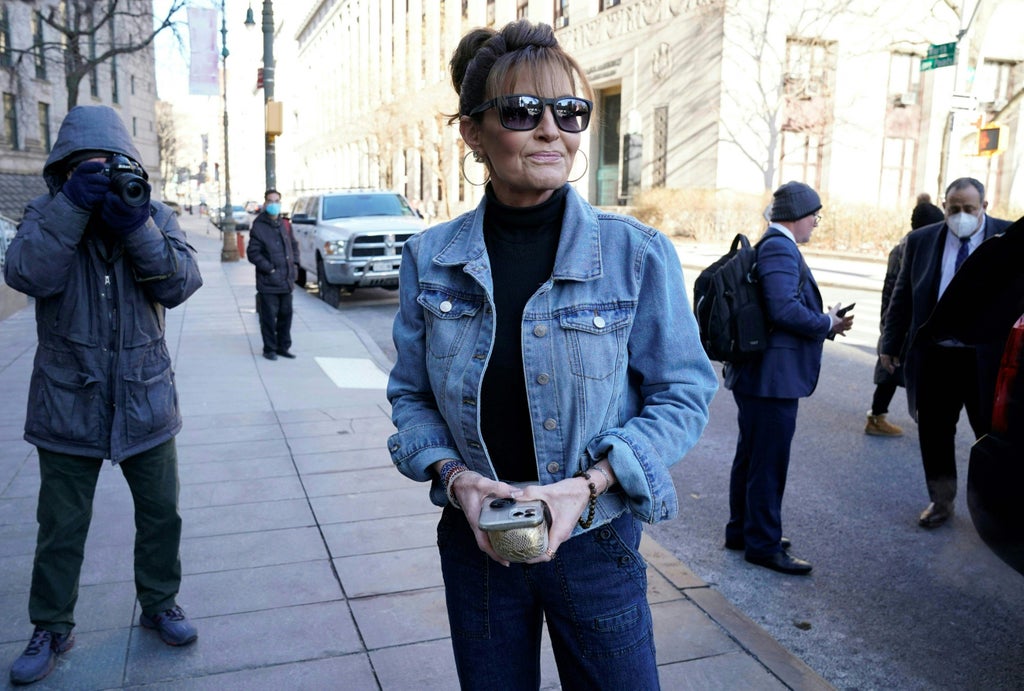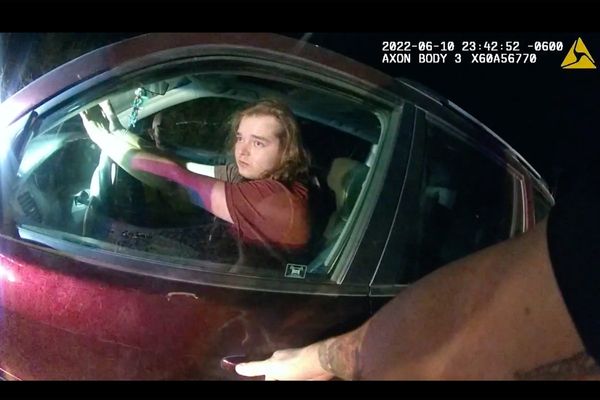
Jurors have determined that The New York Times is “not liable” following Sarah Palin’s claims of defamation against the newspaper after two days of deliberations in the high-profile libel case.
US District Judge Jed Rakoff already indicated he intends to dismiss the former Alaska governor’s complaint, after determining that Ms Palin’s legal team failed to show that the newspaper’s 2017 editorial and the editor at the centre of the case published with actual malice.
The newspaper and then-editorial editor James Bennet did not defame Ms Palin in the editorial, according to the jury’s unanimous verdict delivered on 15 February. An appeal is expected.
In remarks to attorneys on Monday, Judge Rakoff said he believes the case to be “an example of very unfortunate editorializing” but that it did not rise to the standard of “actual malice” – a standard established by the US Supreme Court in libel cases against public figures in 1967 following a landmark ruling in another case involving the newspaper, The New York Times Co v Sullivan.
Ms Palin’s complaint marked the rare case in which a libel suit against a newspaper made it to trial, one that has been closely watched by press freedom groups, First Amendment lawyers and media organisations for its potential impact to the kinds of broad legal protections for journalists and publishers when writing about public figures.
In a statement following the verdict, the newspaper said the verdict is a “reaffirmation of fundamental tenet of American law.”
“Public figures should not be permitted to use libel suits to punish or intimidate news organisations that make, acknowledge and swiftly correct unintentional errors,” the newspaper said.
The editorial at the centre of the trial – “America’s Lethal Politics” – criticised a rise in volatile political rhetoric in the aftermath of a 2017 shooting at a congressional baseball game, characterised by the newspaper’s editorial board as probable evidence of America’s increasingly “vicious” politics.
Ms Palin was not the subject of the editorial, but a map from her political action committee – featuring crosshairs over Democratic-leaning congressional districts – was cited as an example, pointing to a 2011 shooting in Arizona that killed six people, including a nine-year-old girl, and injured then-congresswoman Gabby Giffords.
In the course of editing the story, Mr Bennet added a sentence saying that “the link to political incitement was clear” – which Ms Palin believes had falsely implied a causal link between herself and the 2011 shooting.
The editorial was promptly corrected, adding a statement that the newspaper “incorrectly stated that a link existed between political rhetoric and the 2011 shooting” and that it had “incorrectly described” the map. A post on Twitter said that “we got an important fact wrong.”
The jury was tasked with determining whether the newspaper knowingly and recklessly published false information against her.
In his remarks to the jury following the verdict, Judge Rakoff said he reached the same decision.
“You decided the facts, I decided the law,” he said. “It turns out they were both in agreement.”
In her testimony last week, Ms Palin said she felt “powerless” and lacked a platform to combat the claims.
“It was devastating to read, again, an accusation, false accusation, that I had anything to do with murdering innocent people,” she said from the witness stand on 10 February.
Ms Palin – the 2008 Republican vice presidential candidate – also said that “the door is always open” for her return to public office, and she has continued to make appearances on Fox News, at Turning Point USA events, and on reality television series, including The Masked Singer, which he called the “most fun 90 seconds of my life.”
“It paid some bills,” she said.
She also acknowledged that she campaigned for Roy Moore in the Alabama Senate race three months after the editorial was published, as attorneys for the newspaper sought to undermine her claims of professional or personal damage in the wake of the editorial.
In closing arguments, New York Times attorney David Axelrod rejected characterisations that the editorial was a “political hit piece” after Ms Palin testified that she believed the editorial was a testament to widespread bias against right-wing figures in American media.
Ms Palin’s lawyer Kenneth Turkel suggested the editorial reflected an atmosphere of indifference and arrogance, as well as animus towards Ms Palin, in the years leading up to and surrounding the editorial that contributed to the errors.
“There’s common thread through all the pieces as to how they treat people on the right they don’t agree with,” he said in closing remarks on Friday. “Look at the common thread: how in every single one of them they demonise the right wing or just treated them differently.”
“If the intent was to defame, if the intent was to harm political rivals,” why would Mr Bennet admit the mistake, take responsibility and seek to correct the record following publication, Mr Axelrod asked.
“This wasn’t a quiet correction,” he said.
Mr Bennet’s attempts to correct the editorial in the hours after its publication is “not consistent with a conspiracy,” according to Mr Axelrod. “That’s consistent with making a mistake and wanting to get it right.”







